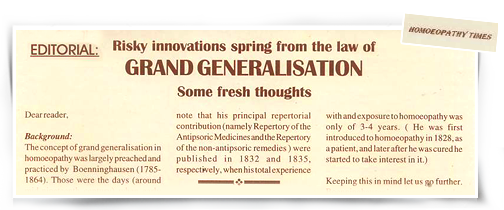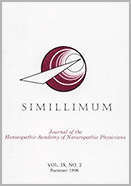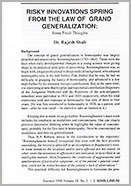Risky innovations spring from the law of grand generalization
The concept of grand generalization in Homeopathy was largely preached and practiced by Boenninghausen (1785-1864). Those were the days when early development changes in a young science were giving shape to its analytical principles of prescribing.
 Risky innovations spring from the law of grand generalization
Risky innovations spring from the law of grand generalization
by Dr. Rajesh Shah, M.D.
Simillimum Vol.IX, No.2, Summer 1996, USA
Background:
The concept of grand generalization in Homeopathy was largely preached and practiced by Boenninghausen (1785-1864). Those were the days when early development changes in a young science were giving shape to its analytical principles of prescribing. Boenninghausen was, to begin with a legal professional without medical background who adopted homeopathy only in mid-forties. Fine thinker that he was, he had no difficulty in grasping the basics of Homeopathy, and advanced it a few steps further by his immense literary contributions, But, at the same time, it is interesting to note that his principal of repertorial contribution (Repertory of the Anti-psoric Medicines and the Repertory of the non-antipsoric remedies) were published in 1832 and 1835 respectively, when his total experience with and exposure to Homeopathy was only in 1828, as a patient, and later after he was cured he started to take an interest in it.

Keeping this in mind, let us go further. Boenninghausen's main work includes his emphasis on modalities and concomitants. One can clearly perceive innovative thinking when he highlights the value of concomitants, probably for the first time in homeopathy. Next he concentrated on modalities, and then on generalization.
Thus H.A Roberts writes in the introduction to the repertory: "Boenninghausen himself recognized that even with the best possible case-taking, the record is often left in an incomplete or fragmentary state. In some instances the localities and/or parts affected are not stated. In other cases the sensation or affection is not indicated, or described in an intelligible manner. Most frequently the conditions of aggravations and ameliorations of particular symptoms, or the patients general condition, could not be stated because of the patient's lack of observation."
This practical difficulty led Boenninghausen to formulate the principle of analog, to help complete the totality.
"If, for instance, it was possible by questioning the patient to decide what aggravates or ameliorates a particular symptom of the case, the patient would readily express a condition of a amelioration of some other symptom. It did not take long discover that conditions of aggravations or amelioration are not confined to this or that particular symptom but that, like the red thread in the cordage of the British Navy, they apply to all the symptoms of the case."
Is this justified? Some fresh thinking...

Let us give unprejudiced attention to this conclusion drawn by Boenninghausen. Is this justification logical? When you cannot find a modality of some other symptom, is it correct to apply the modality of some other symptoms to the previous symptom, under the pretext of Grand generalization? For instance, if the headache does not have any specific modality in a given patient, but his pain in the leg is worse at 4.pm.., can you apply the said modality to headache and prescribe Lycopodium?
How far is scientifically justifiable t cut and paste the modalities from one part to another, from generals to particulars and vice versa?
The high risk approach
The freedom available in grand generalization is a high risk, since it excites in the prescriber his innovative capabilities, it can lead to disaster because, under the pretext of the generalization, one can generalize almost any symptom to any extent.
Phatak, in the preface to his repertory, writes that Boger had knack of generalizing the particulars, he seems to be praising this procedure of Boger and Boenninghausen by giving an example of particular awkwardness (of the limbs) which was generalized by Boger as awkwardness of the mind and body. Phatak also quotes from his practice some examples and also convert some of the particulars into generals in his repertory. For example, in one he used successfully the rubric 'unsteady sensation' by generalizing it. That made him upgrade the same in his repertory. He does not mention, however, whether the up-gradation was based on a single observation or on multiple cases.
Generalization or peculiar?
When you freely generalize any symptom, automatically you fail to appreciate the characteristic particulars. For instance, Bryonia has a dryness of the mouth with thirstlessness. This is a keynote symptom. This thirstlessness associated with dryness of the mouth cannot be generalized as thirstlessness in Bryonia. Lycopodium does not have 4 pm or 4-8 pm aggravation as far as diarrhea is concerned. That is Podophyllum. Lycopodium cannot be prescribed blindly for any symptom that causes up at 4 pm. Likewise; involuntary stools call for Aloe, while involuntary urination calls for some other remedy. (And, will involuntary talking - i.e. loquacity, be Aloe as well?) The principle of grand generalization does not stand true in these cases.
If the principle of grand generalization is applied to every particular symptom, converting it into a general, a lot of damage will be done to homeopathy. If all the prescribers start upgrading the particular modality to a general modality by treating a couple of cases successfully, then one day all the particular characteristics and the keynotes will vanish from the materia medica. Kent and Hering were thoughtful in criticizing Boenninghausen's concept of generalization.
Back to the drug proving, every medicinal stimulus produces a very specific disturbance exciting, eventually, a specific symptom at the physical (or mental) level. That alone is true materia medica, nothing more and nothing less.
Generalization and the mentals
Innovative generalization of the physicals, when carried up to the level of mind, becomes uncontrollable. What do you understand by the symptom 'Fear of falling'? My humble understanding is simple: fear of falling down, mainly from a higher place. Can you generalize it to also mean a fear of falling down from some higher position in life? (say a rich person becoming poor, or an honorable person fears losing respect? Is this also covered by the symptom? Please think about it.

Let us take some more examples to check further if this is logical. Pain in the knee joint worse by initial motion and better by continuous motion calls for Rhus tox. If the patient says that he gets pain in the rectum during the early part of passing stool, and it does not pain later on, will that also be the symptom of Rhus tox, by generalization of the modality? If the patient says that he tends to get nervous on starting to write the examination, but regains confidence after writing for a while, can this also be Rhus tox? If this can be a Rhus tox case, then what about Silica?! Think...
Stiffness of the joints (Rhus tox) can not be transcribed as stiffness of the mind. The mind and yielding Pulsatilla can also have a stiff neck!
The combination of sensation and the location makes a symptom characteristic. For example, stitching pain in the fingers calls for Cicuta, while the same pain in the chest calls for Bryonia, or if in the dorsal region may require Petroleum, and so on. Blind grand generalization will certainly take away characteristic particulars from the materia medica.
Generalization causing disasters
Today, if you closely examine some of the recent theories raised in the name of 'innovation' or 'artistic prescribing'. You will notice that they are broadly based on the principle of grand generalization.
A person dreaming of snakes every day is prescribed not any of the remedies, which have produced dreaming of snakes in proving. Instead, as per the so-called law of generalization, one gets liberty to apply the analogy and mythology of the snake to prescribe a remedy which may not have dreams of snakes in the proving! Likewise, every mental symptom can be distorted, colored, decorated, and twisted with imagination, depending on the prescribers fantasies.
Apparently refreshing ideas based on the forcibly stretched principle of generalization, if nurtured today, will become instrumental in corroding homeopathy tomorrow. I am glad to learn that some of the thinkers have already realized this fact.
Where is the scientific temperament?
Homeopathy is a science based on the final study of symptomatology, where the slightest change in the system could the remedy. The principle of grand generalization, and more so its recent branches, are potent destructors of homeopathy. Nearing the completion of 200 years of Homeopathy, should we not getting more scientific and more rational?
Reprinted from Homeopathy Times, July 1995 Dr Rajesh Shah practises in Bombay. He is the author of My Experiences with Ferrum Metallicum, and edits Homeapathy Times